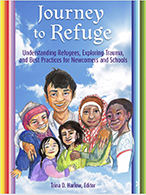College of Education e-book a new resource for those who work with refugee students
Monday, June 17, 2019
MANHATTAN — Just in time for World Refugee Day on June 20, the Kansas State University College of Education has produced a free e-book for professionals and volunteers working with newcomer students.
"Journey to Refuge: Understanding Refugees, Exploring Trauma and Best Practices for Newcomers and Schools" can be used as a stand-alone resource or as a companion to the college's documentary "Refuge in the Heartland." Both are available online. The e-book can be accessed at coe.ksu.edu/journey-to-refuge/ and the film can be viewed at coe.k-state.edu/refuge-in-the-heartland/index.html.
Trina Harlow, art education instructor and e-book editor, was a driving force behind the projects. Harlow's travels and opportunities to teach children in various parts of the world exposed her to the beauty — and suffering — that exists across the globe, and she decided to act.
"If we all did something right where our two feet stand, collectively we might do something to help make the world a better place for the children, adolescents and adults who call it home," Harlow said.
The e-book — 15 independently functioning chapters and spotlight segments — is divided into three sections. The first describes what it means to be a refugee, the second is devoted to trauma and how it affects the brain, and the final section offers best practices for schools and youth organizations.
Harlow said the e-book is ideal for educators, youth group staff, clergy, nonprofit organizations and various agency personnel and volunteers working with children and adults who are refugees in camps, resettlement locations or places of asylum, as well as for anyone who has experienced trauma.
"Trauma is a life experience that is so intense it affects your physical and psychological being," Harlow said. "It could be something that happened to a child born in Ness City, Kansas, or it could be something that happened to a child in the Congo. Teachers need to understand trauma because we can help students by acknowledging and understanding what they've been through."
Each chapter closes with questions designed to spur reflection followed by a spotlight that highlights a contributor's personal experience or unique perspective. Harlow thinks the e-book would also be a valuable resource for school and university courses.
"Having been a teacher for 25 years, there are a couple of chapters in the book that had I known years ago would have been a life-changer for me as an educator," she said.
Harlow was pleasantly surprised that each subject matter expert she reached out to agreed to author a chapter, including seven colleagues in the Kansas State University College of Education. As a result, many of the world's champions for refugee populations contributed to the e-book.
Contributors include Jacqueline Bhabha, international policymaker, attorney and professor of the practice of health and human rights at the Harvard University T.H. Chan School of Public Health and director of research of the Harvard FXB Center for Health and Human Rights; Lily Yeh, co-founder of Barefoot Artists and cabinet member of the U.S. Department of Art and Culture; Joshua Orawo Onong'no, senior protection assistant at the United Nations refugee agency, UNHCR, in Kenya; Diana Delbecchi, gap experience assistant director at St. Norbert College in Wisconsin and refugee camp staffer; Max Frieder and Joel Bergner, founders and directors of Artolution; Andrea Davis Pinkney, New York Times bestselling children's book author; Leah Spelman, associate director of Partnerships for Trauma Recovery in Berkeley, California; Paola Gomez, founder of Muse Arts;Johanna Reynolds, arts facilitatorat Muse Arts and staff member at York University Centre for Refugee Studies in Toronto, Canada; and Sally Adnams Jones, creative art and trauma expert.
Harlow recently received an email praising "Journey to Refuge" from Jill Drzewieckiwith Jesuit Refugee Services in Rome, Italy.
"The global refugee situation can feel so overwhelming that at times people wonder how they could make a difference," Drzewiecki wrote. "Amid this reality, 'Journey to Refuge' offers a path forward for anyone who wants to move beyond despair to action, with concrete tools. Regardless of where you are from — from Kansas to a refugee camp in Kenya — the reader feels compelled to act and be part of solutions in this unprecedented age of human displacement."
Harlow credits Debbie Mercer, College of Education dean, and Rusty Earl, the college's video producer, for making the e-book and video possible.
"These projects came to life because our extraordinary dean recognized the benefit to students and educators and supported our efforts to take the lead in this discussion," Harlow said. "Rusty not only filmed and edited the documentary, but he also contributed one of the spotlights. His lens as a father, man of faith and educator added meaningful insights to this important topic."
In addition to Harlow, the Kansas State University faculty members who wrote chapters include Susan Yelich Biniecki, associate professor of educational leadership; Socorro Herrera, professor and director of the Center for Intercultural and Multilingual Advocacy; Judy Hughey, associate professor of special education, counseling and student affairs; and Be Stoney, associate professor of curriculum and instruction.

